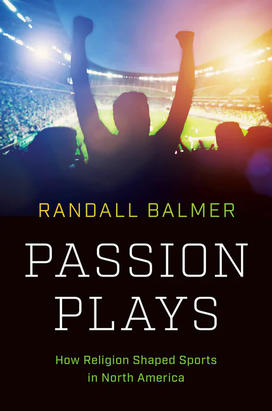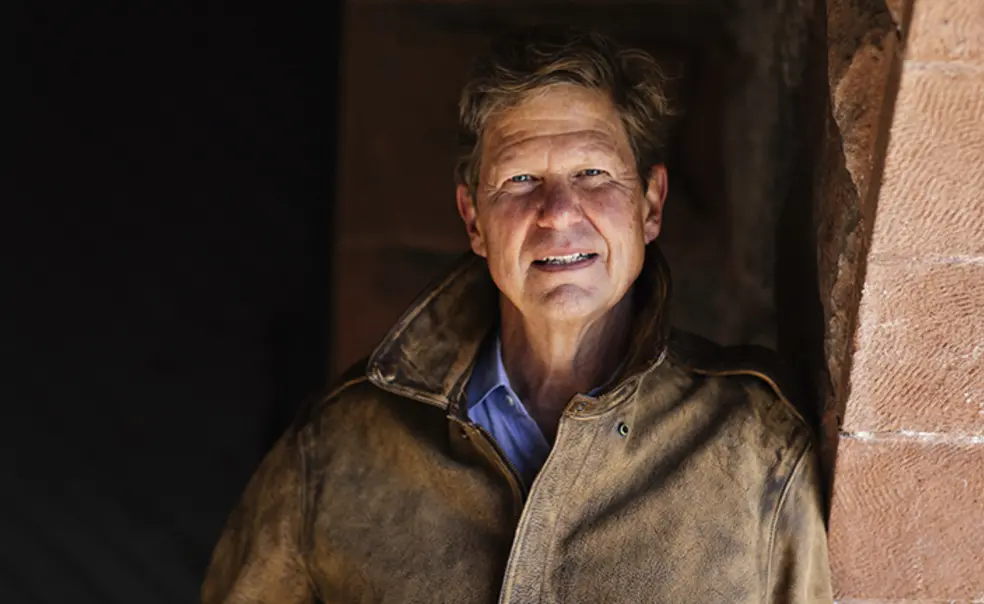Randall Balmer *85 Studies the Intersection of Religion and American Life
In his new book, Balmer says sports is the ‘new religion’ in America
You might say Randall Balmer *85 was destined to become a professor of American religious history. The eldest son of a prominent evangelical minister, Balmer grew up with not only a deep interest in and reverence for religion, but also a fascination with American life. After all, he’d seen a lot of it: He and his family moved frequently based on his father’s church assignments, bouncing from Chicago to Nebraska, then to rural Minnesota, Michigan, and Des Moines, Iowa, where Balmer attended high school. Summers were also spent touring the country, as Balmer, his four younger brothers, and their parents would pile into a sedan and drive to his father’s annual religious conference.
“It was in a different place every year: Ocean Grove, New Jersey; Denver; Seattle. I loved those trips,” says Balmer, who is now a prize-winning religious historian, Emmy Award nominee, and chair of the religion department at Dartmouth. “I just loved looking out the window and watching the landscape scroll by. I became fascinated with the diversity of life in North America.”
After earning his bachelor’s and master’s degrees in history from Trinity International University in Illinois, Balmer set his sights on Princeton for a Ph.D. — even though he was convinced he didn’t have a shot at acceptance.
“I like to say that a clerical error brought me to Princeton,” he says, with his characteristic humility. “My mentor, John Wilson, always chuckles when I say that. But he’s never denied it, either.”
True to his upbringing, Balmer — who was ordained as an Episcopal priest in 2006 — is drawn to topics that intersect religion and American history, particularly politics. In his more than 20 books, Balmer has explored the role of religion in shaping American presidencies and written extensively about evangelicalism. And he has delved into the impact of faith on Mitt Romney, Billy Graham, and Donald Trump.
“John F. Wilson was my principal adviser [at Princeton], and he was terrific. He let me pursue my interests without a whole lot of [regulation] — certainly nothing heavy-handed,” Balmer says. “He really did shape my life and my career in very, very important ways.”
Balmer’s latest book was inspired by his time at Princeton — specifically, by his time with another brilliant mind: John Murrin, the late Colonial historian and co-founder of the history department’s summer softball team, the Revolting Masses. Murrin “loved to hear the administration team chant the customary tribute at game’s end: ‘Rah, rah, rah, Revolting Masses!’” Balmer says. “He really got a kick out of that.”
During his time in the dugout, Murrin would routinely make thoughtful, philosophical comments on American sports. For example, Murrin dubbed baseball the “quintessential immigrant game,” where “the batter is outnumbered nine to one, there are three islands of safety out there in that hostile territory, and the greatest triumph is to return home,” Balmer says.
For the next 40 years, Balmer reflected and expanded on Murrin’s sports insights. When he was presented with the opportunity to create a new religion course at Dartmouth that would appeal to the school’s athletes, Balmer realized it was time to put these thoughts to paper.

He says sports is the “new religion” in America. “And I think this is particularly true of the demographic of some white males, who see in the world of sports an alternate universe of clarity, unlike their perceptions — and I underscore perceptions — of the larger world, which they think is somehow unfair to them. So they can retreat into this alternate universe of utter clarity, where something is either in-bounds or out-of-bounds, fair or foul — where even the fields of play are defined by right angles.”
Balmer is currently working on a book and television documentary about orthodoxy in Alaska, as well as a biography of Mark Hatfield, the late U.S. senator from Oregon. “He was a remarkable man, probably the last liberal Republican in America — and also an evangelical and just a gentleman in so many ways,” Balmer says. “A fascinating individual.”










No responses yet